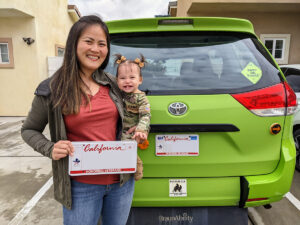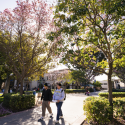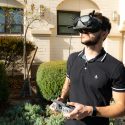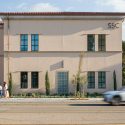APIDA Heritage Month: Spotlight on VRC Counselor Jane Duong Killer
More than 27 million people have a driver’s license in California. Yet only 50 of those drivers are female veterans who have received a special license plate honoring their military service.
During this Asian Pacific Islander and Desi American (APIDA) Heritage Month, Fullerton College salutes Jane Duong Killer for her service to our country and celebrates how she breaks barriers and provides key support to our students in the Veterans Resource Center.
“It’s very exciting to be one of the first 50 to receive this special Woman Veteran license plate because as women, especially Asian American women, we are less likely to be recognized by others as a veteran,” Killer said.
Killer serves as an adjunct counselor at the Veterans Resource Center and was recently one of the first 50 female veterans in California to receive a special license plate honoring women veterans through an initiative spearheaded by Foundation for Women Warriors. KCAL News shared her story during a segment of Veterans’ Voices, which highlights veteran stories across Southern California.
Very few Asian Americans hold the title of U.S. Veteran. In fact, according to a 2021 U.S. Census Report, only 1.9 percent of veterans in 2021 identified as Asian-American. The percentage is even less for Asian-American women veterans.
Killer shared that one would be surprised at how many times people will make the initial assumption that she is not the veteran and will ask her, “Did your husband serve?”
“When people think of veterans, they generally don’t think of women, so when a woman is driving a car with a veteran license plate, they assume that it must be her husband or significant other who is the veteran and not herself,” she said. She said it’s happened to her several times, but now with the new license plate, which features the silhouette of a woman servicemember with the words “Woman Veteran” underneath, this will help lessen the number of times she’s overlooked as being the veteran in her family.
Killer is not overlooked at Fullerton College. She’s an important member of the Fullerton College community, serving as a counselor and mentor in the VRC where she helps student-veterans transition out of the military and into student life. She enjoys bringing many of her life and educational experiences into her daily work when counseling students.
“I see the many aspects of my identities as my strengths because it helps me relate and make authentic connections with the students I serve,” she said. “For instance, in being a first-generation Asian-American, a female veteran, the first in my family to earn a college degree, and having the various responsibilities I have in my personal life, I’ve learned to be more empathetic and can anticipate the potential needs of my students, whether they are veterans, dependents of veterans, or caregivers to a family member.”
Killer shared that her mother is a refugee of the Vietnam War and immigrated to the U.S. where she had her family. She said that it was one of her driving factors for joining the military right after high school and saw it as an honorable thing to be able to serve her country.
Killer not only cares for Fullerton College students, but she is also an important caregiver for her family, serving as the primary caregiver for her younger brother with cerebral palsy and a mom to her one-year-old daughter. She also values service to her community. In 2019, she was awarded the Connected Women of Influence – Orange County Veteran of Influence Award and prior to joining Fullerton College, she worked at UC Irvine as the acting and assistant director of the Veterans Services Center and Cal State Long Beach where she managed a mental health and suicide prevention program. She believes her lived experiences, challenges, and successes, all help strengthen the connections she has with students and the impact she hopes to make in their lives.
“My passion is helping student veterans redefine their leadership skills and build self-confidence to successfully complete their degree and gain a fulfilling career after their service,” she added.
Killer said that she didn’t always know that she wanted to be a counselor. In fact, she was a medic while serving in the military, which influenced her to pursue a career in medicine where she majored in microbiology at Cal State Long Beach. After discovering how much she enjoyed her work in higher education and the well-being of students, she decided to pursue her master’s in counseling with a focus in higher education. She says student-veterans don’t want to waste time and often believe that because they did a certain job in the military, it would be faster if they continued with earning a college degree in that field.
“That doesn’t have to be the case,” she said. “I tell students all the time that they don’t have to do the same job they had in the military and if they wanted to, can pursue something completely different. Their time at Fullerton College is the perfect occasion for them to explore the things that they are interested in learning and are passionate about, which they may never have had the opportunity to when joining the military at such a young age.”
She does her best to counsel students to explore many career options and discover their passion through the things they care about.
Those who know and work with Killer say she is patient, and kind, and leads with lots of care and compassion, taking time to listen and get to know each of her students.
In celebration of Asian Pacific Islander and Desi American (APIDA) Month, Fullerton College will host a series of events to celebrate the diverse identities, histories, and lived experiences of all Asian Pacific Islander and Desi Americans.
Learn about Fullerton College APIDA Heritage Month events on News Center.






